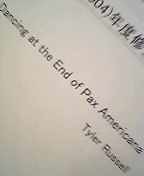Thursday, June 2, 2005
DANCER IN THE DARK (REDUX)
Interesting observations about Korean/Japanese govt. sanctioned art exhibitions by a man in the know:
Regardless of the end result, one must ask why the organizer would seek ethnic purity in their curatorial voice. And while I don't know that there is any one answer, there are a lot of theories. Currently, North Korea is run under the philosophy of Juche, or Korean self-sufficiency based on Confucianism, and some say that South Korea is beginning to come under the influence of this philosophy! Since 2002 or so, some observers mention that there has been a strong rise in a "go it alone" attitude in South Korea. Some people point to Korea's strong showing in the FIFA World Cup which it co-hosted with Japan and the visually strong "We Are the Reds" fan movements or the North-South rapprochement. Other still point to the leftist nationalist Uri Party (literally translated into English as: Our Party) coming to power in the Korean Parliament. Then some mention the rise of anti-Americanism mentioned in chapter 2. And it is important to note that others still mention the aggravating visits of the Japanese Prime Minister to the Yasukuni Shrine and disputes with Japan over the naming of the Sea that lies between them, possession of a particular little islet, and the content of Japanese schools' history textbooks as instigating factors of the present trend.
Independence is laudable and it can have its definite curatorial benifits, but active trends towards exclusivity and ethno-nationalist purity have worrying underpinnings and potential consequences in an age of global interactivity and conflict. As a significant chunk of Japanese officially sanctioned cultural discourse has sought to creat Japanese space for Asians to be Asians in Asia, its Korean counterpart seeks Korean space for Koreans to imprint a Korean image on a global world. Like the artworks reviewed in the previous chapter, Japanese exhibitions' attempts at regional integration that are conceptually moving towards a more global/universal context stand side-by-side with Korean exhibitions' attempts to globalize its cultural discourse coloured by an increasing trend towards nationalism...
- From Dancing at the End of Pax Americana, Tyler Russell (2004 Grad thesis at Tokyo University of Arts)
